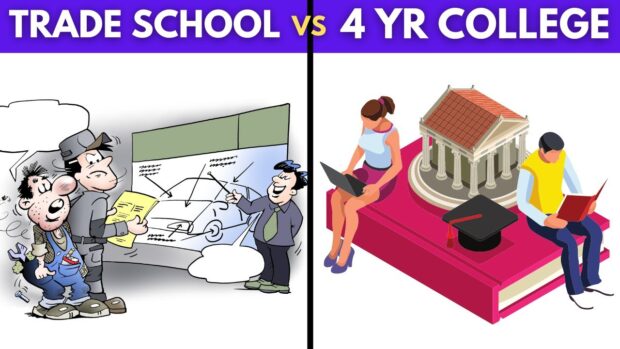Deciding on your educational or career path can feel like a high-stakes decision. Many people, especially recent high school graduates or those looking for a career change, weigh the value of trade-focused learning against the traditional college route.
Trade-oriented programs provide practical education tailored to specific industries, offering quicker and often more affordable paths to employment. Let’s explore if this is the right choice for you.
Key Points
- Trade-focused programs offer specialized, career-specific training.
- Costs are lower, and time commitments are shorter than college.
- Job opportunities often align with industry needs.
- Interests, skills, and long-term goals are key to making the right choice.
- Research and planning are essential before enrolling.
What Makes Trade-Focused Education Unique?

Trade-focused education emphasizes real-world skills over theory, offering a direct path to employment. It’s an option for those who prefer hands-on learning and clear outcomes.
Programs like WorkTexas are setting benchmarks in student-friendly approaches, as Mike Feinberg discusses in a conversation with TPPF. By prioritizing practical skills, institutions like WorkTexas equip students for industries in need of skilled professionals, such as construction and healthcare.
This approach works especially well for those looking for a clear transition into the workforce without committing to the extended timelines and costs of traditional college degrees. It’s about learning the tools of the trade, applying them effectively, and stepping into a role where those skills are needed.
Benefits of Choosing This Path
Trade-focused programs bring tangible advantages for students ready to commit to a specific career path. Let’s look deeper into the most important benefits.
- Lower Costs: Affordability is one of the biggest draws. Tuition is often more manageable than traditional college fees, with fewer additional expenses like housing or textbooks. Programs may even partner with employers to provide financial assistance.
- Shorter Duration: While college degrees can take four years or more, trade-focused training typically spans six months to two years, allowing graduates to enter the workforce sooner.
- Career-Specific Training: Programs are highly focused, which means you’ll spend time mastering the tools, techniques, and knowledge required for your chosen field.
- Job Opportunities in Growing Industries: Many industries, such as HVAC, welding, and medical technology, are in high demand. This ensures job placement rates are often higher for graduates compared to some traditional degrees.
By choosing this path, you can gain skills that meet workforce needs, ensuring you’re well-positioned for success.
How to Decide If It’s the Right Fit

Making the right choice starts with introspection and research. Not everyone is suited for trade-focused programs, but they can be life-changing for those who are.
Ask yourself:
- What are your strengths? If you excel at hands-on tasks, practical training might suit you.
- What are your career goals? Consider if your desired field requires a traditional degree or if a shorter, specialized program can get you there.
- Can you commit to the program? These programs are often intensive, requiring full dedication to coursework and practical sessions.
- What are the financial implications? Look into scholarships, grants, or employer-subsidized options.
Evaluating these points will clarify if this path aligns with your personal and professional goals.
Trade School vs. College: Which Is Better for You?

Many people weigh the pros and cons of trade-focused learning versus traditional college. The decision largely depends on your career goals, learning style, and financial situation.
Trade School:
- Shorter duration with a focus on hands-on training.
- Lower overall costs and quicker paths to employment.
- Suitable for technical or trade-specific roles, such as electricians, dental hygienists, or carpenters.
College:
- Broader academic exposure with potential for advanced career roles.
- Higher costs and longer timelines, requiring a significant investment of time and money.
- Ideal for careers requiring advanced degrees, such as engineering or medicine.
Consider what aligns better with your aspirations and available resources.
Common Misconceptions About Trade-Focused Learning
Some people hesitate because of outdated stereotypes about trade-focused education. Addressing these misconceptions can help you make an informed decision.
- “It’s only for those who didn’t do well in school.” In reality, trade-focused learning requires focus, dedication, and practical intelligence.
- “It doesn’t lead to high-paying jobs.” Many roles, such as electricians and dental hygienists, offer competitive salaries, with room for growth.
- “It’s not as respected as a college degree.” Industries in need of skilled workers highly value trade-focused graduates.
Recognizing the value of these programs can shift your perspective on the opportunities they offer.
Tips for Choosing the Right Program
The success of your trade-focused journey depends on finding a program that fits your goals and needs. Follow these steps:
- Define Your Career Goals: Identify what you’re passionate about and what career aligns with those interests.
2. Research Programs: Look for institutions with accreditation and strong connections to employers.
3. Tour Campuses: Visit facilities to assess equipment, teaching methods, and classroom environments.
4. Speak to Alumni: Gather insights from former students about program effectiveness and job placement rates.
5. Consider Financial Aid: Explore grants, scholarships, and payment plans that can make tuition manageable.
Doing your homework ensures you invest your time and money wisely.
Career Options for Trade-Focused Students

Programs offer a wide variety of career paths in industries with significant demand.
- Healthcare: Roles like phlebotomist, radiology technician, and medical assistant.
- Technology: Opportunities in network administration and cybersecurity.
- Skilled Trades: Options like plumbing, HVAC, and carpentry.
- Creative Arts: Specializations in culinary arts, graphic design, and cosmetology.
- Automotive: Careers in repair and engineering technology.
These fields not only provide stability but also opportunities for growth and specialization.
What to Expect Once You Enroll
Enrolling in a trade-focused program is an exciting step, but it requires commitment and effort. Here’s what you can anticipate:
- Intensive Learning: Programs are designed to equip students with the skills they need in a short timeframe. This means compact schedules with practical and theoretical components.
- Hands-On Training: Expect to spend time in workshops, labs, or real-world settings learning directly on the tools and equipment used in the industry.
- Networking Opportunities: Building connections with instructors and peers is invaluable for future job placement.
By staying focused and motivated, you can make the most of your educational experience.
Signs You’re Ready for Trade-Focused Education
Not everyone is suited for this path. Here are some indicators that you’re ready to commit:
- You prefer practical, hands-on learning over theoretical studies.
- You have a clear career goal that doesn’t require a traditional degree.
- You’re eager to start working sooner rather than later.
- You’re looking for an affordable, efficient education option.
If these points resonate with you, it may be time to start exploring programs that align with your aspirations.
Conclusion
Trade-focused education offers practical, affordable, and efficient pathways into high-demand careers. It’s a great option for those who value hands-on learning and have clear career goals. By assessing your interests, researching programs, and understanding the benefits, you can make an informed decision.
Whether you’re a high school graduate or someone seeking a fresh start, trade-focused programs can open doors to fulfilling opportunities. Take your time, explore your options, and choose a path that aligns with your goals.
 Jewel Beat
Jewel Beat

